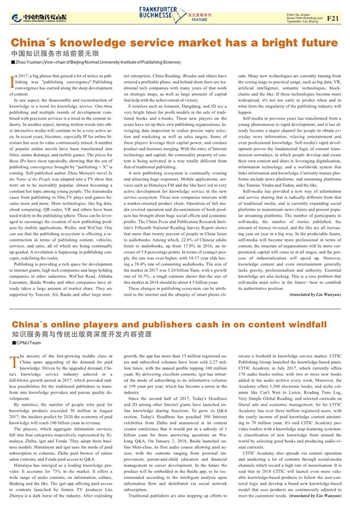In 2017, a big phrase that gained a lot of notice in publishing was "publishing convergence".Publishing convergence has carried along the deep development of content.
In one aspect, the disassembly and reconstruction of knowledge is a trend for knowledge service. One-time publishing and multiple rounds of development combined with precision services is a trend in the content industry. In another aspect, turning written words into other interactive media will continue to be a very active area. In recent years, literature, especially IP for online literature has seen its value continuously mined. A number of popular online novels have been transformed into films, anime &manga, and mobile games. The prices for these IPs have risen repeatedly, showing that the era of publishing convergence brought by "publishing + X" is coming. Self-published author Zhou Meisen's novel In the Name of the People was adapted into a TV show that went on to be incredibly popular, almost becoming a constant hot topic among young people. The transmedia cases from publishing to film,TV plays and games became more and more. More technologies, like big data, cloud computing, QR codes, VR and others have been used widely in the publishing sphere. These can be leveraged to encourage the creation of new publishing products by mobile applications, Weibo, and WeChat. One can see that the publishing ecosystem is effecting a reconstruction in terms of publishing content, vehicles, services, and sales, all of which are being continually up-graded. A revolution is happening in publishing concepts, redefining the realm.
Publishing is providing a rich space for development to internet giants, high tech companies and large holding companies in other industries. WeChat Read, Alibaba Literature, Baidu Wenku and other companies have already taken a large amount of market share. They are supported by Tencent, Ali, Baidu and other large internet enterprises. China Reading, iReader and others have entered a profitable phase, and behind them there are traditional tech companies with many years of that work on strategic maps, as well as large amounts of capital that help with the achievement of victory.
E-retailers such as Amazon, Dangdang, and JD see a very bright future for profit models in the sale of traditional books and e-books. These new players on the scene have set up their own publishing organisations, leveraging data inspection to realise precise topic selection and marketing as well as sales targets. Some of these players leverage their capital power, and conduct product and business merging. With the entry of Internet technology and capital, the commodity property of content is being activated in a way totally different from that of traditional publishing.
A new publishing ecosystem is continually creating and attracting huge responses. Mobile applications, services such as Himalaya FM and the like have led to very active development for knowledge service in the new service ecosystem. These new companies innovate with a market-oriented product chain. Operation of full media covered operation and dis-semination of book products has brought about huge social effects and economic profits. The China Press and Publication Research Institute's Fifteenth National Reading Survey Report shows that more than twenty percent of people in China listen to audiobooks. Among which, 22.8% of Chinese adults listen to audiobooks, up from 17.0% in 2016, an increase of 5.8 percentage points. In terms of younger people, the rate was even higher, with 14-17 year olds having a 28.4% rate of consuming audiobooks. The size of the market in 2017 was 3.24 billion Yuan, with a growth rate of 36.7%, a rough estimate shows that the size of this market in 2018 should be about 4.5 billion yuan.
These changes in publishing ecosystem can be attributed to the internet and the ubiquity of smart phone clients. Many new technologies are currently turning from the testing stage to practical usage, such as big data, VR, artificial intelligence, semantic technologies, blockchains and the like. If these technologies become more widespread, it's not too early to predict when and in what form the singularity of the publishing industry will happen.
Self-media in previous years has transformed from a young phenomenon to rapid development, and it has already become a major channel for people to obtain everyday news information, relaxing entertainment and even professional knowledge. Self-media's rapid development proves the fundamental logic of content transmission nowadays, in which people develop and create their own content and share it, leveraging digitalisation, information technology, and a worldwide system that links information and knowledge. Currently mature platforms include news platforms and streaming platforms like Toutiao, Youku and Tudou, and the like.
Self-media has provided a new way of information and service sharing that is radically different from that of traditional media, and is currently expanding social platforms to mainstream news clients and present popular streaming platforms. The number of participants in self-media, the number of stories published, the amount of money invested, and the like are all increasing year on year in a big way. In the predictable future, self-media will become more professional in terms of content, the structure of organisations will be more corporatized, capital will come in at all stages, and the process of industrialization will speed up. However, knowledge content and even entertainment generally lacks gravity, professionalism and authority. Essential knowledge are also lacking. This is a core problem that self-media must solve in the future—how to establish its authoritative position.
(translated by Liu Wanyun)


